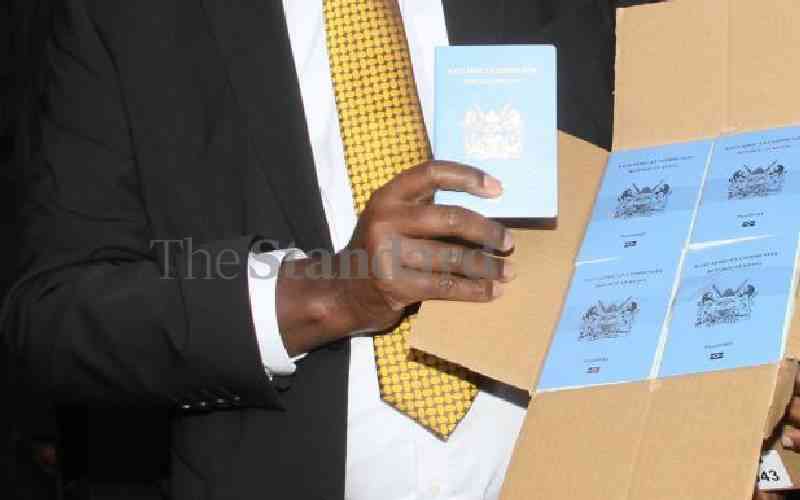NAIROBI: In the early part of the nineteenth century when the first freed slaves from the USA and the Caribbean islands landed on the West African coast under the auspices of the American Colonisation Society, little did they know that more than a century and a half later their newly found freedom would turn into chains for a new generation of Africans. Their new territory was called “Liberia:” the land of freedom, founded on the motto “the love of freedom brought us here.” That freedom was never enjoyed by all Liberians. Only 18 per cent of the population, the “returned negroes” as it were, knew what it meant. When “the other natives” finally sought their freedom several years later, a dysfunctional political system could not respond creatively. The outcome was disastrous.
Liberia, like Ethiopia, in the late nineteenth century when the Europeans carved out pieces of Africa to themselves and called them “colonies”, was never colonised. But Liberia also shared a distinction with Haiti as the oldest black “free state” in the world, both having been independent for close to 200 years by the time the rest of African colonies were “gaining their independence” in the 1960s.
Yet both Liberia and Haiti, by the beginning of the twenty first century were the most backward, underdeveloped, poverty stricken, disaster-prone and violence-ridden independent nations on the face of mother earth. The current drama that we see in the play “Eclipsed”, written by Danai Gurira, currently being staged Off Broadway at the Public Theatre in New York, condenses this history of the misery of underdevelopment and violence in the lives of four women during the 1989-2003 Civil War in Liberia.
Art, as it were, has a way of condensing centuries of human experience into a short journey that can only be lived on the stage as drama: and art does this with the penetrating effect that no other form of human endeavour can do. “Eclipsed” summarises the disastrous consequences of political oppression and economic exploitation on the lives of ordinary people, particularly women and children, in a failed state. Soldiers, the men who rise to power through the barrel of the gun in such a state use brute force to get such power, maintain it and kill those who threaten them. Inevitably they fall from grace by equally brutal force.
The man identified in the play simply as the “C.O” is the commanding officer in the Liberian rebel army out to get rid of Charles Taylor, the brutal Liberian leader who took over power in 1989 from Master Sergeant Samuel Kenyon Doe, the military dictator who overthrew the civilian government of William Tolbert in 1980. Never seen and never heard from in the play, C.O. commands a rag tag group of soldiers, predominantly male, well known for their brutality and savage sexual exploitation of women. C.O. has taken into captivity four “wives” living in one room, and identified by their rank in this harem as numbers 1, 2, 3, and 4. No doubt this nameless quartet symbolises the human degradation that women have gone through almost in all civil wars and political conflicts in post-independence Africa from Sierra Leone to Angola through Congo to Uganda and Somalia.
But the women do not take their predicament lying down. They are determined to live fulfilling lives even under the roof of that very depressive one room from where they sexually serve their master one after the other. Outside in the wilderness, as two of them bolt out in search of freedom through the barrel of the gun, the women are equally indefatigable. First to leave is the bold and self-assured number 2, played by Zainab Jah. It is her zeal to free her “co-wives” from that miserable sexual slavery that leads number 4, played by Lupita Nyong’o, to take her destiny in her hands armed with a gun following number 2 into the bush. From then on, they assure each other, no man will ever mess up with them again because the balance of power will no doubt be the determinant factor and not just sexual frailty. It is not just a question of “making peace” as suggested by the peace mission brought to them in the bush by Rita, played by Akosou Busia. Peace for what? With who? And for who? Such bold questions asked from positions of strength and not apologetically, bring structured and lasting peace that can be institutionalised.
What is interesting about all the women engaged in this play as author, director, producers and actors is that they are all global Africans. Some were born outside the continent but went to school “back home” in their childhood, ending up with higher education abroad. Some were born “at home”, wandered abroad in search of education, settled here and there and finally found some fixed abode where they feel at home. All these women, however, as noted in the “Playbill”, call Africa home, and their commitment to their home continent is profound. Name them: Pascale Armand was born in the USA of Haitian parents; Akosua Busia from Ghana, living in the US; Zainab Jah grew up in Freetown, Sierra Leone, but born in London; Saycon Sengbloh African-American/Liberian; Lupita Nyong’o is Kenyan born in Mexico, and the author, Danai Gurira, is Zimbabwean living in the US.
Having watched the play, my wish is that it should be shown all over the world more conveniently as a movie. This is where Mo Ibrahim would become useful to us. This play is educational. It is political. It is cultural. It would be the kind of movie that tells you why arms and daggers are tearing at the heart of our continent and where this heart bleeds most: among our women. To improve governance in Africa we must not only stop internal conflicts but empower our women. Our women, empowered, will not be so easily enslaved. They will stand up against oppression. They will be strong enough to be bedrock of sustainable peace. Not that men will not be there with them; but men without women are like reeds shaken by the wind: they easily bend to opportunism. Mo Ibrahim: your crusade for democratic governance should embrace supporting such useful plays to be made into films to be seen widely in Africa. Let “Eclipsed” come Off Broadway to the screens in Africa so that our people can be entertained and learn from it.
 The Standard Group Plc is a
multi-media organization with investments in media platforms spanning newspaper
print operations, television, radio broadcasting, digital and online services. The
Standard Group is recognized as a leading multi-media house in Kenya with a key
influence in matters of national and international interest.
The Standard Group Plc is a
multi-media organization with investments in media platforms spanning newspaper
print operations, television, radio broadcasting, digital and online services. The
Standard Group is recognized as a leading multi-media house in Kenya with a key
influence in matters of national and international interest.
 The Standard Group Plc is a
multi-media organization with investments in media platforms spanning newspaper
print operations, television, radio broadcasting, digital and online services. The
Standard Group is recognized as a leading multi-media house in Kenya with a key
influence in matters of national and international interest.
The Standard Group Plc is a
multi-media organization with investments in media platforms spanning newspaper
print operations, television, radio broadcasting, digital and online services. The
Standard Group is recognized as a leading multi-media house in Kenya with a key
influence in matters of national and international interest.








